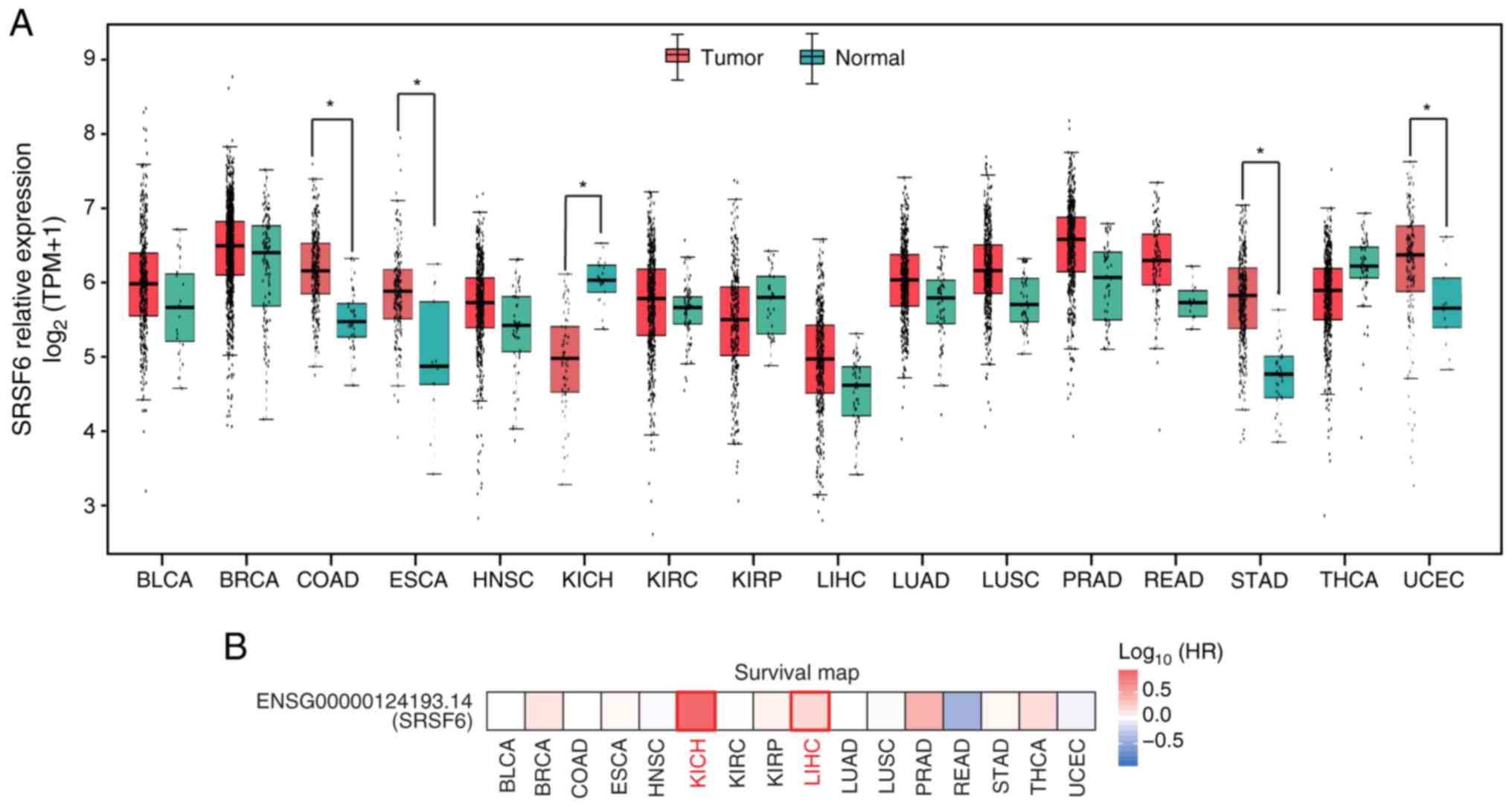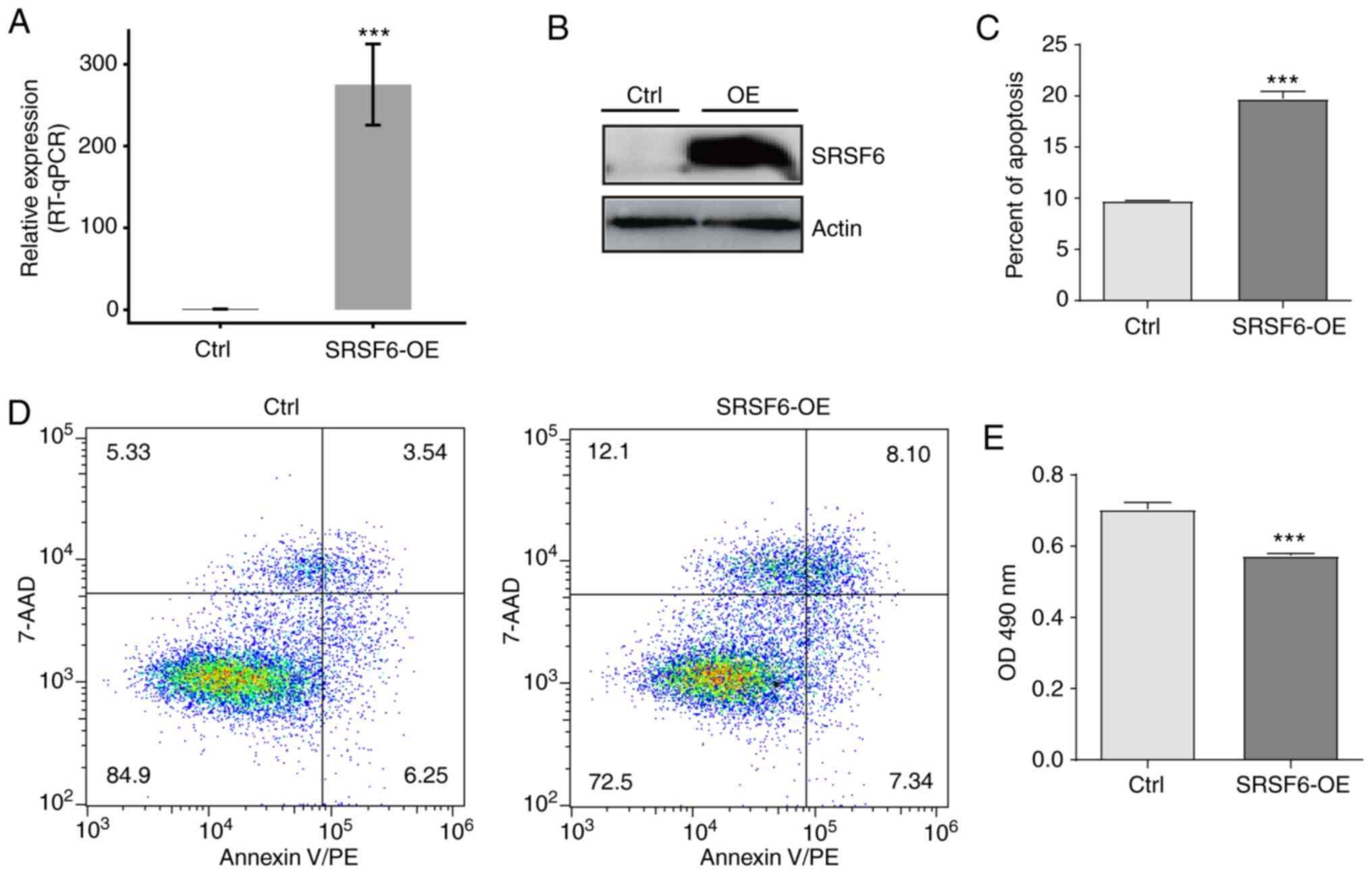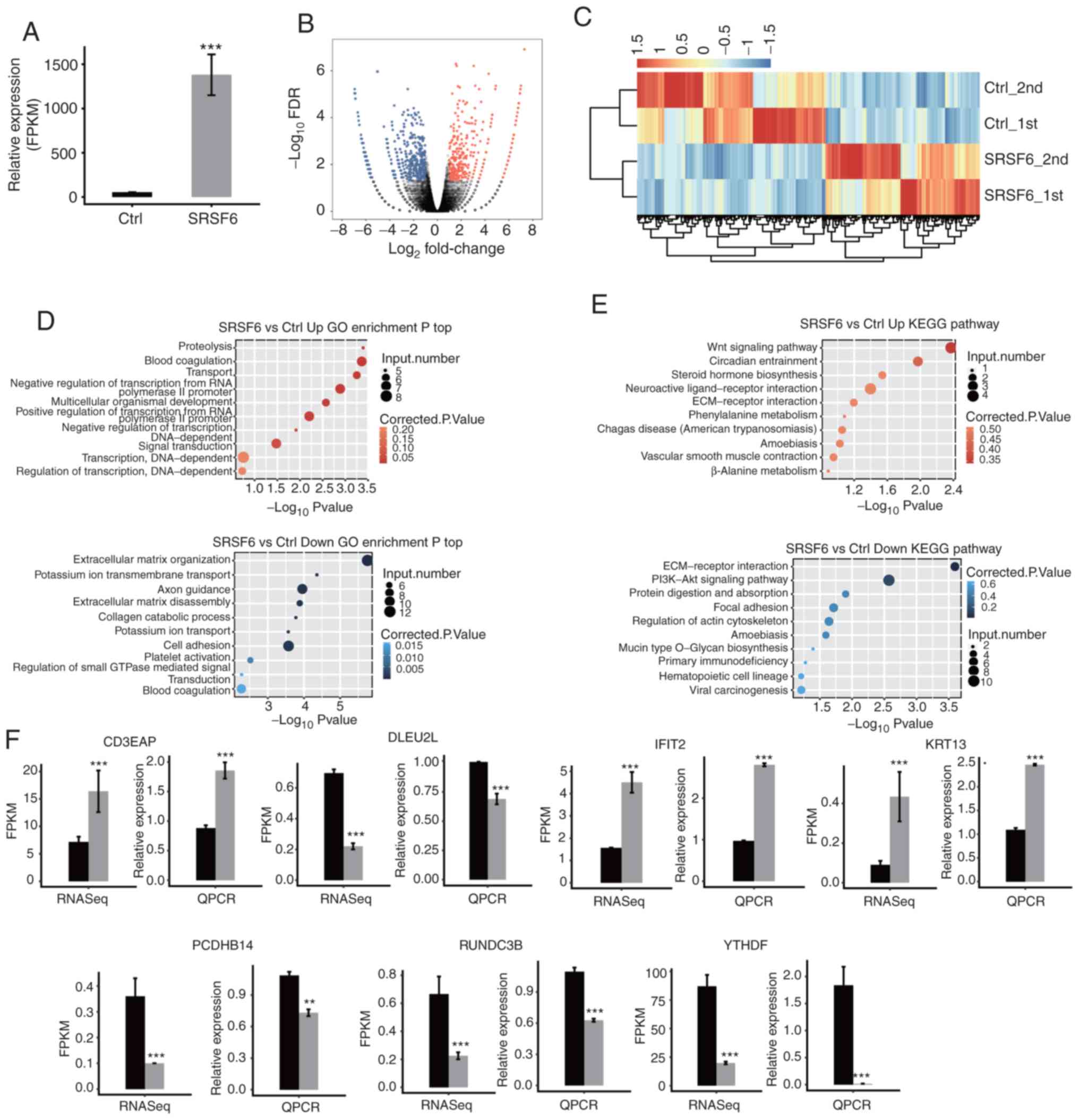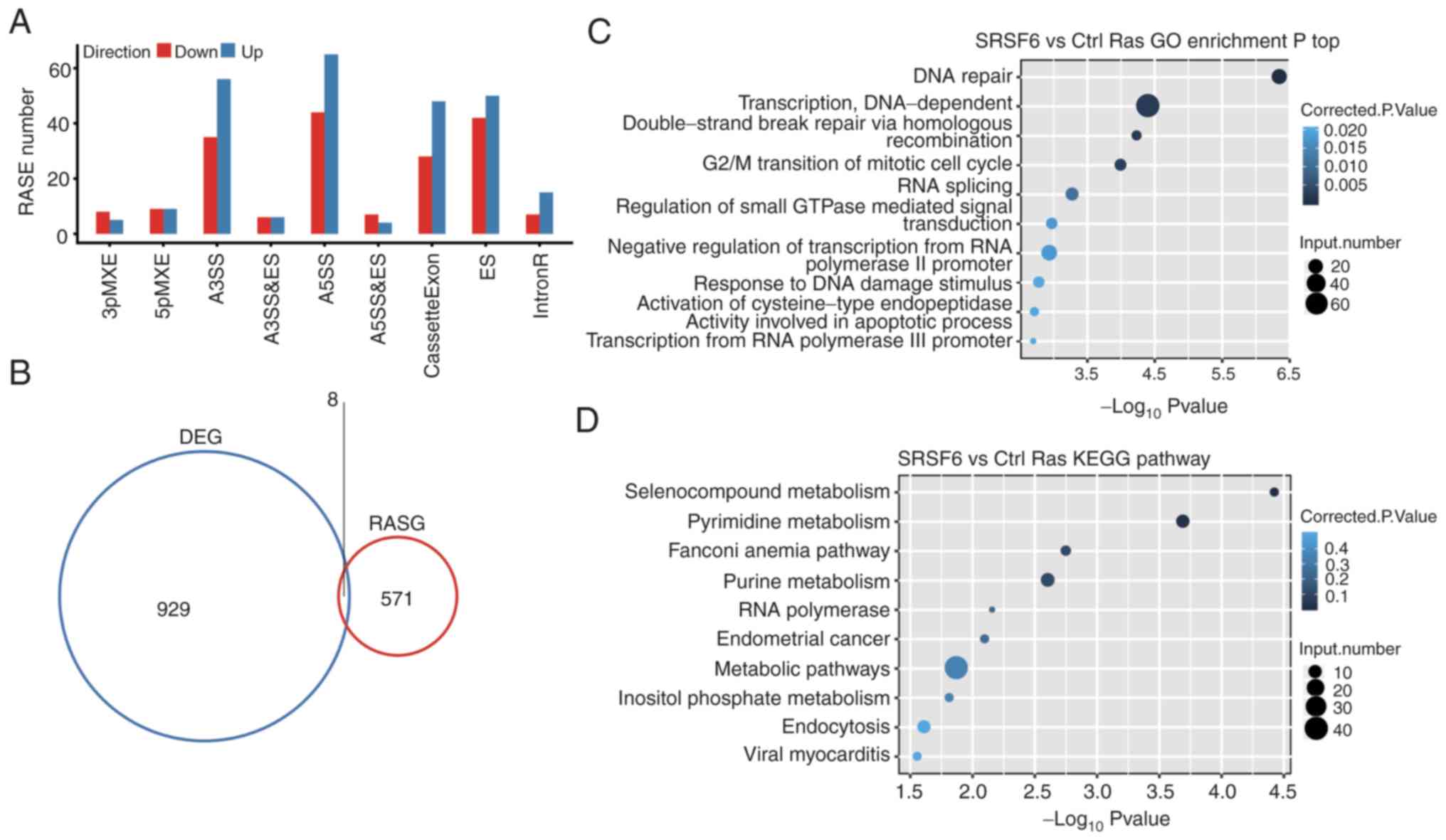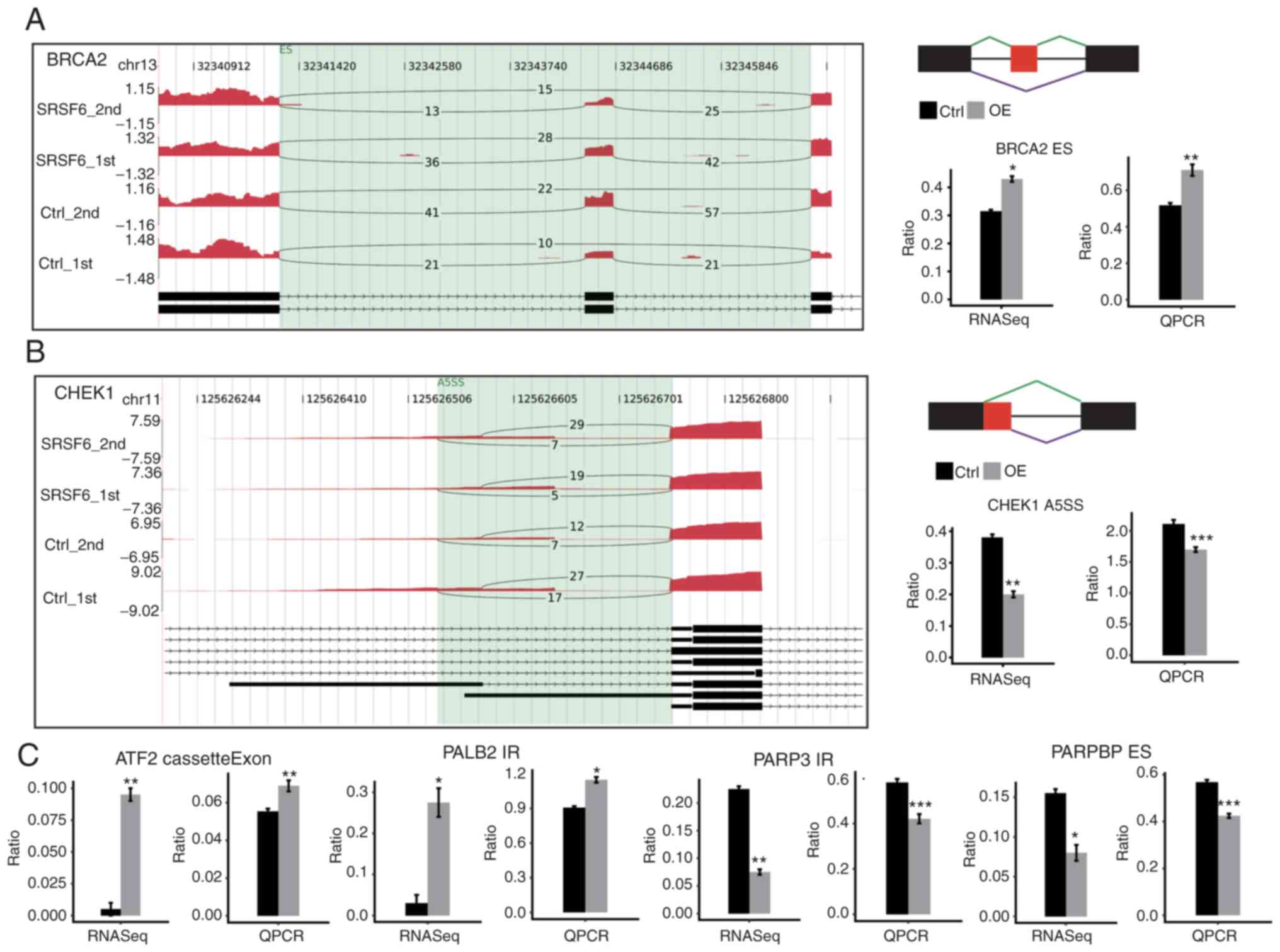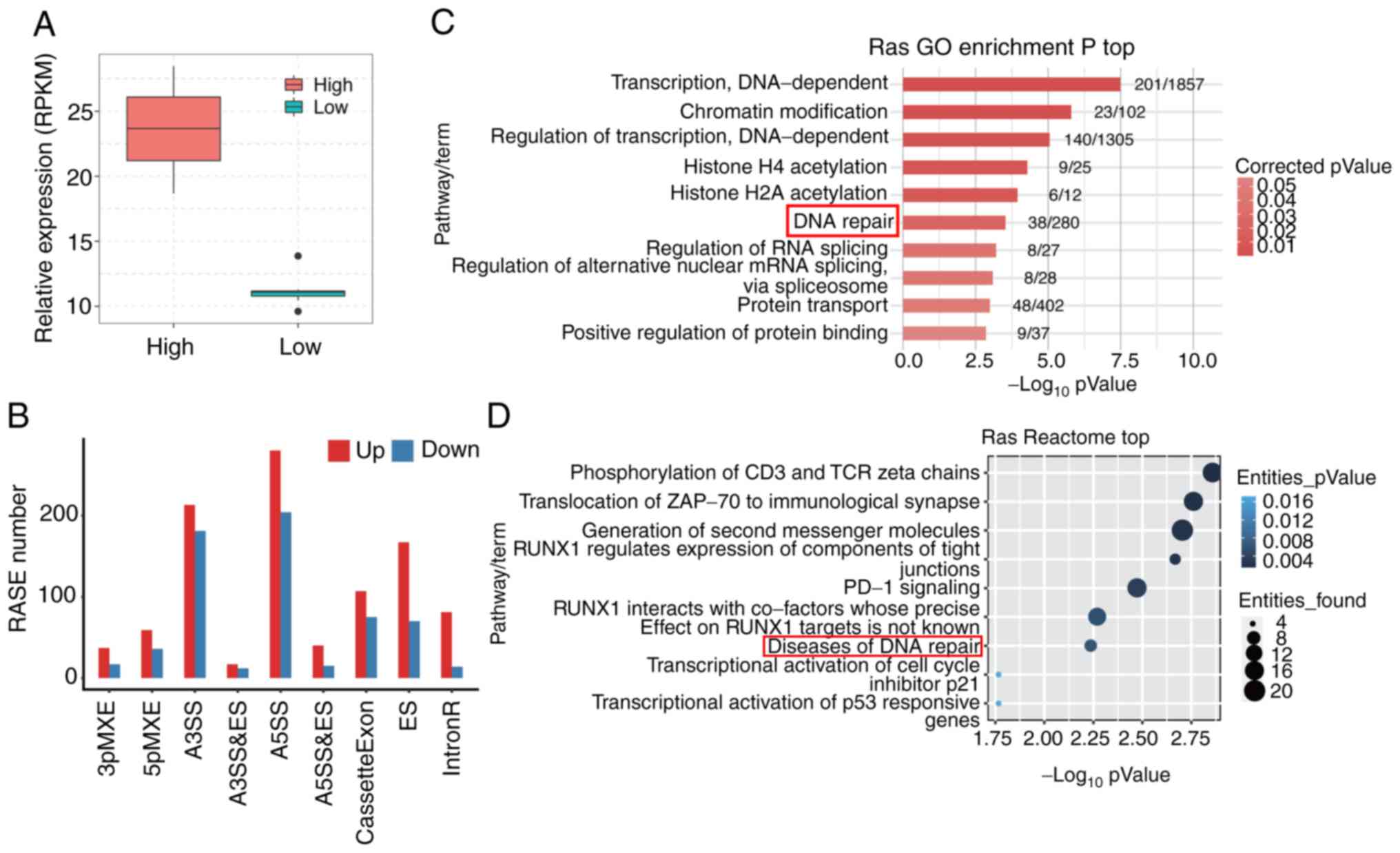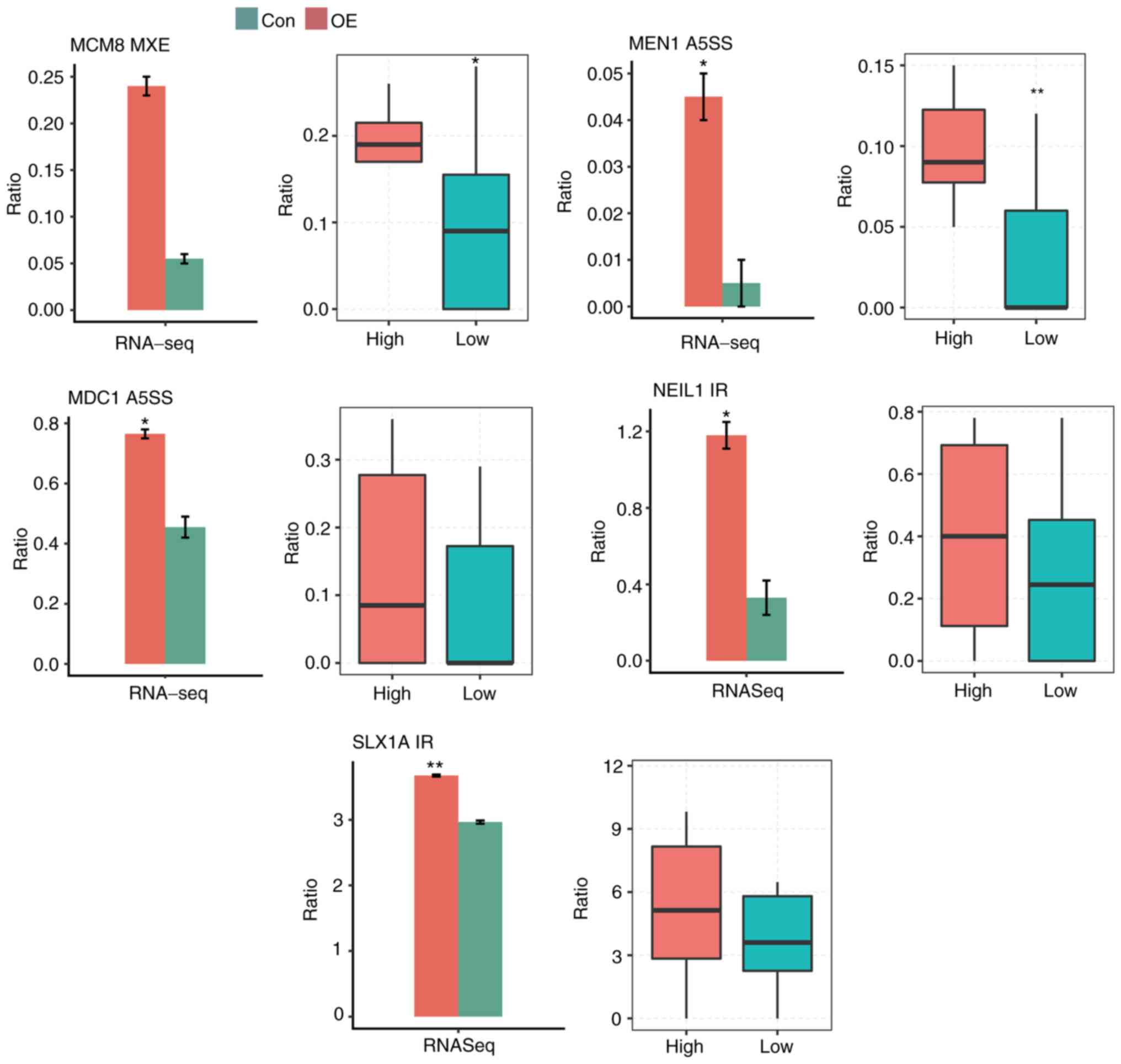|
1
|
Bray F, Ferlay J, Soerjomataram I, Siegel
RL, Torre LA and Jemal A: Global cancer statistics 2018: GLOBOCAN
estimates of incidence and mortality worldwide for 36 cancers in
185 countries. CA Cancer J Clin. 68:394–424. 2018. View Article : Google Scholar : PubMed/NCBI
|
|
2
|
DePinho RA: The age of cancer. Nature.
408:248–254. 2000. View
Article : Google Scholar : PubMed/NCBI
|
|
3
|
Preston DL, Mattsson A, Holmberg E, Shore
R, Hildreth NG and Boice JD Jr: Radiation effects on breast cancer
risk: A pooled analysis of eight cohorts. Radiat Res. 158:220–235.
2002. View Article : Google Scholar : PubMed/NCBI
|
|
4
|
Barbieri CE, Baca SC, Lawrence MS,
Demichelis JF, Blattner M, Theurillat JP, White TA, Stojanov P, Van
Allen E, Stransky N, et al: Exome sequencing identifies recurrent
SPOP, FOXA1 and MED12 mutations in prostate cancer. Nat Genet.
44:685–689. 2012. View
Article : Google Scholar : PubMed/NCBI
|
|
5
|
Kaczkowski B, Tanaka Y, Kawaji H, Sandelin
A, Andersson R, Itoh M, Lassmann T, Hayashizaki Y, Carninci P and
Forrest AR; FANTOM5 Consortium, : Transcriptome analysis of
recurrently deregulated genes across multiple cancers identifies
new pan-cancer biomarkers. Cancer Res. 76:216–226. 2016. View Article : Google Scholar : PubMed/NCBI
|
|
6
|
Robinson D, Van Allen EM, Wu YM, Schultz
N, Lonigro RJ, Mosquera JM, Montgomery B, Taplin ME, Pritchard CC,
Attard G, et al: Integrative clinical genomics of advanced prostate
cancer. Cell. 161:1215–1228. 2015. View Article : Google Scholar : PubMed/NCBI
|
|
7
|
Cancer Genome Atlas Research Network, .
The molecular taxonomy of primary prostate cancer. Cell.
163:1011–1025. 2015. View Article : Google Scholar : PubMed/NCBI
|
|
8
|
Grasso CS, Wu YM, Robinson DR, Cao X,
Dhanasekaran SM, Khan AP, Quist MJ, Jing X, Lonigro RJ, Brenner JC,
et al: The mutational landscape of lethal castration-resistant
prostate cancer. Nature. 487:239–243. 2012. View Article : Google Scholar : PubMed/NCBI
|
|
9
|
Hanahan D and Weinberg RA: Hallmarks of
cancer: The next generation. Cell. 144:646–674. 2011. View Article : Google Scholar : PubMed/NCBI
|
|
10
|
Lord CJ and Ashworth A: The DNA damage
response and cancer therapy. Nature. 481:287–294. 2012. View Article : Google Scholar : PubMed/NCBI
|
|
11
|
Shkreta L and Chabot B: The RNA splicing
response to DNA damage. Biomolecules. 5:2935–2977. 2015. View Article : Google Scholar : PubMed/NCBI
|
|
12
|
Mata J, Marguerat S and Bähler J:
Post-transcriptional control of gene expression: A genome-wide
perspective. Trends Biochem Sci. 30:506–514. 2005. View Article : Google Scholar : PubMed/NCBI
|
|
13
|
Venables JP: Aberrant and alternative
splicing in cancer. Cancer Res. 64:7647–7654. 2004. View Article : Google Scholar : PubMed/NCBI
|
|
14
|
Wang ET, Sandberg R, Luo S, Khrebtukova I,
Zhang L, Mayr C, Kingsmore SF, Schroth GP and Burge CB: Alternative
isoform regulation in human tissue transcriptomes. Nature.
456:470–476. 2008. View Article : Google Scholar : PubMed/NCBI
|
|
15
|
David CJ and Manley JL: Alternative
pre-mRNA splicing regulation in cancer: Pathways and programs
unhinged. Genes Dev. 24:2343–2364. 2010. View Article : Google Scholar : PubMed/NCBI
|
|
16
|
Srebrow A and Kornblihtt AR: The
connection between splicing and cancer. J Cell Sci. 119:2635–2641.
2006. View Article : Google Scholar : PubMed/NCBI
|
|
17
|
Ward AJ and Cooper TA: The pathobiology of
splicing. J Pathol. 220:152–163. 2010. View Article : Google Scholar : PubMed/NCBI
|
|
18
|
Skotheim RI and Nees M: Alternative
splicing in cancer: Noise, functional, or systematic? Int J Biochem
Cell Biol. 39:1432–1449. 2007. View Article : Google Scholar : PubMed/NCBI
|
|
19
|
Howe D and Lynas C: The cyclin D1
alternative transcripts [a] and [b] are expressed in normal and
malignant lymphocytes and their relative levels are influenced by
the polymorphism at codon 241. Haematologica. 86:563–569.
2001.PubMed/NCBI
|
|
20
|
Knudsen KE, Diehl JA, Haiman CA and
Knudsen ES: Cyclin D1: Polymorphism, aberrant splicing and cancer
risk. Oncogene. 25:1620–1628. 2006. View Article : Google Scholar : PubMed/NCBI
|
|
21
|
Comstock CE, Augello MA, Benito RP, Karch
J, Tran TH, Utama FE, Tindall EA, Wang Y, Burd CJ, Groh EM, et al:
Cyclin D1 splice variants: Polymorphism, risk, and isoform-specific
regulation in prostate cancer. Clin Cancer Res. 15:5338–5349. 2009.
View Article : Google Scholar : PubMed/NCBI
|
|
22
|
Wu JY and Maniatis T: Specific
interactions between proteins implicated in splice site selection
and regulated alternative splicing. Cell. 75:1061–1070. 1993.
View Article : Google Scholar : PubMed/NCBI
|
|
23
|
Kohtz JD, Jamison SF, Will CL, Zuo P,
Lührmann R, Garcia-Blanco MA and Manley JL: Protein-protein
interactions and 5′-splice-site recognition in mammalian mRNA
precursors. Nature. 368:119–124. 1994. View Article : Google Scholar : PubMed/NCBI
|
|
24
|
Long JC and Caceres JF: The SR protein
family of splicing factors: Master regulators of gene expression.
Biochem J. 417:15–27. 2009. View Article : Google Scholar : PubMed/NCBI
|
|
25
|
Liu J, Huang B, Xiao Y, Xiong HM, Li J,
Feng DQ, Chen XM, Zhang HB and Wang XZ: Aberrant expression of
splicing factors in newly diagnosed acute myeloid leukemia.
Onkologie. 35:335–340. 2012. View Article : Google Scholar : PubMed/NCBI
|
|
26
|
Zou L, Zhang H, Du C, Liu X, Zhu S, Zhang
W, Li Z, Gao C, Zhao X, Mei M, et al: Correlation of SRSF1 and
PRMT1 expression with clinical status of pediatric acute
lymphoblastic leukemia. J Hematol Oncol. 5:422012. View Article : Google Scholar : PubMed/NCBI
|
|
27
|
Anczuków O, Akerman M, Cléry A, Wu J, Shen
C, Shirole NH, Raimer A, Sun S, Jensen MA, Hua Y, et al:
SRSF1-Regulated alternative splicing in breast cancer. Mol Cell.
60:105–117. 2015. View Article : Google Scholar : PubMed/NCBI
|
|
28
|
Cohen-Eliav M, Golan-Gerstl R, Siegfried
Z, Andersen CL, Thorsen K, Ørntoft TF, Mu D and Karni R: The
splicing factor SRSF6 is amplified and is an oncoprotein inlung and
colon cancers. J Pathol. 229:630–639. 2013. View Article : Google Scholar : PubMed/NCBI
|
|
29
|
Jensen MA, Wilkinson JE and Krainer AR:
Splicing factor SRSF6 promotes hyperplasia of sensitized skin. Nat
Struct Mol Biol. 21:189–197. 2014. View Article : Google Scholar : PubMed/NCBI
|
|
30
|
Wan L, Yu W, Shen E, Sun W, Liu Y, Kong J,
Wu Y, Han F, Zhang L, Yu T, et al: SRSF6-regulated alternative
splicing that promotes tumour progression offers a therapy target
for colorectal cancer. Gut. 68:118–129. 2019. View Article : Google Scholar : PubMed/NCBI
|
|
31
|
Karni R, de Stanchina E, Lowe SW, Sinha R,
Mu D and Krainer AR: The gene encoding the splicing factor SF2/ASF
is a proto-oncogene. Nat Struct Mol Biol. 14:185–193. 2007.
View Article : Google Scholar : PubMed/NCBI
|
|
32
|
Anczukow O, Rosenberg AZ, Akerman M, Das
S, Zhan L, Karni R, Muthuswamy SK and Krainer AR: The splicing
factor SRSF1 regulates apoptosis and proliferation to promote
mammary epithelial cell transformation. Nat Struct Mol Biol.
19:220–228. 2012. View Article : Google Scholar : PubMed/NCBI
|
|
33
|
Jia R, Li C, McCoy JP, Deng CX and Zheng
ZM: SRp20 is a proto-oncogene critical for cell proliferation and
tumor induction and maintenance. Int J Biol Sci. 6:806–826. 2010.
View Article : Google Scholar : PubMed/NCBI
|
|
34
|
Fernando C, Audibert A, Simon F, Tazi J
and Juge F: A role for the serine/arginine-rich (SR) protein
B52/SRSF6 in cell growth and myc expression in drosophila.
Genetics. 199:1201–1513. 2015. View Article : Google Scholar : PubMed/NCBI
|
|
35
|
Kong J, Sun W, Li C, Wan L, Wang S, Wu Y,
Xu E, Zhang H and La M: Long non-coding RNA LINC01133 inhibits
epithelial-mesenchymal transition and metastasis in colorectal
cancer by interacting with SRSF6. Cancer Lett. 380:476–484. 2016.
View Article : Google Scholar : PubMed/NCBI
|
|
36
|
Tang Z, Li C, Kang B, Gao G, Li C and
Zhang Z: GEPIA: A web server for cancer and normal gene expression
profiling and interactive analyses. Nucleic Acids Res. 45:W98–W102.
2017. View Article : Google Scholar : PubMed/NCBI
|
|
37
|
Tu Y, Wu X, Yu F, Dang J, Wei Y, Yu H,
Liao W, Zhang Y and Wang J: Tristetraprolin-RNA interaction map
reveals a novel TTP-RelB regulatory network for innate immunity
gene expression. Mol Immunol. 121:59–71. 2020. View Article : Google Scholar : PubMed/NCBI
|
|
38
|
Livak KJ and Schmittgen TD: Analysis of
relative gene expression data using real-time quantitative PCR and
the 2(-Delta Delta C(T)) method. Methods. 25:402–408. 2001.
View Article : Google Scholar : PubMed/NCBI
|
|
39
|
Kim D, Pertea G, Trapnell C, Pimentel H,
Kelley R and Salzberg SL: TopHat2: Accurate alignment of
transcriptomes in the presence of insertions, deletions and gene
fusions. Genome Biol. 14:R362013. View Article : Google Scholar : PubMed/NCBI
|
|
40
|
Robinson MD, McCarthy DJ and Smyth GK:
EdgeR: A bioconductor package for differential expression analysis
of digital gene expression data. Bioinformatics. 26:139–140. 2010.
View Article : Google Scholar : PubMed/NCBI
|
|
41
|
Xia H, Chen D, Wu Q, Wu G, Zhou Y, Zhang Y
and Zhang L: CELF1 preferentially binds to exon-intron boundary and
regulates alternative splicing in heLa cells. Biochim Biophys Acta
Gene Regul Mech. 1860:911–921. 2017. View Article : Google Scholar : PubMed/NCBI
|
|
42
|
Xie C, Mao X, Huang J, Ding Y, Wu J, Dong
S, Kong L, Gao G, Li CY and Wei L: KOBAS 2.0: A web server for
annotation and identification of enriched pathways and diseases.
Nucleic Acids Res. 39:W316–W322. 2011. View Article : Google Scholar : PubMed/NCBI
|
|
43
|
Jin L, Li G, Yu D, Huang W, Cheng C, Liao
S, Wu Q and Zhang Y: Transcriptome analysis reveals the complexity
of alternative splicing regulation in the fungus verticillium
dahliae. BMC Genomics. 18:1302017. View Article : Google Scholar : PubMed/NCBI
|
|
44
|
Nombela P, Lozano R, Aytes A, Mateo J,
Olmos D and Castro E: BRCA2 and other DDR genes in prostate cancer.
Cancers (Basel). 12:3522019. View Article : Google Scholar
|
|
45
|
Schiewer MJ and Knudsen KE: DNA damage
response in prostate cancer. Cold Spring Harb Perspect Med.
2:a0304862019. View Article : Google Scholar
|
|
46
|
Shen L, Shi Q and Wang W: Double agents:
Genes with both oncogenic and tumor-suppressor functions.
Oncogenesis. 13:252018. View Article : Google Scholar
|
|
47
|
Barros-Filho MC, Guisier F, Rock LD,
Becker-Santos DD, Sage AP, Marshall EA and Lam WL: Tumour
suppressor genes with oncogenic roles in lung cancer. IntechOpen;
2019, https://www.intechopen.com/books/genes-and-cancer/tumour-suppressor-genes-with-oncogenic-roles-in-lung-cancerApril
16–2019 View Article : Google Scholar
|
|
48
|
Yoshida K and Miki Y: Role of BRCA1 and
BRCA2 as regulators of DNA repair, transcription, and cell cycle in
response to DNA damage. Cancer Sci. 95:866–871. 2004. View Article : Google Scholar : PubMed/NCBI
|
|
49
|
Helleday T, Petermann E, Lundin C, Hodgson
B and Sharma RA: DNA repair pathways as targets for cancer therapy.
Nat Rev Cancer. 8:193–204. 2008. View Article : Google Scholar : PubMed/NCBI
|
|
50
|
Jeggo PA, Pearl LH and Carr AM: DNA
repair, genome stability and cancer: A historical perspective. Nat
Rev Cancer. 16:352016. View Article : Google Scholar : PubMed/NCBI
|
|
51
|
Kumar A, Coleman I, Morrissey C, Zhang X,
True LD, Gulati R, Etzioni R, Bolouri H, Montgomery B, White T, et
al: Substantial interindividual and limited intraindividual genomic
diversity among tumors from men with metastatic prostate cancer.
Nat Med. 22:369–378. 2016. View Article : Google Scholar : PubMed/NCBI
|
|
52
|
Klaus B: Statistical relevance-relevant
statistics, part I. EMBO J. 34:2727–2730. 2015. View Article : Google Scholar : PubMed/NCBI
|
|
53
|
Ji X, Li J, Zhu L, Cai J, Zhang J, Qu Y,
Zhang H, Liu B, Zhao R and Zhu Z: CHD1L promotes tumor progression
and predicts survival in colorectal carcinoma. J Surg Res.
185:84–91. 2013. View Article : Google Scholar : PubMed/NCBI
|
|
54
|
Nihira NT and Yoshida K: Engagement of
DYRK2 in proper control for cell division. Cell Cycle. 14:802–807.
2015. View Article : Google Scholar : PubMed/NCBI
|
|
55
|
Sailo BL, Banik K, Girisa S, Bordoloi D,
Fan L, Halim CE, Wang H, Kumar AP, Zheng D, Mao X, et al: FBXW7 in
cancer: What has been unraveled thus far? Cancers (Basel).
19:2462019. View Article : Google Scholar
|
|
56
|
Griffin WC and Trakselis MA: The MCM8/9
complex: A recent recruit to the roster of helicases involved in
genome maintenance. DNA Repair (Amst). 76:1–10. 2019. View Article : Google Scholar : PubMed/NCBI
|
|
57
|
Kamilaris CD and Stratakis CA: Multiple
endocrine neoplasia type 1 (MEN1): An update and the significance
of early genetic and clinical diagnosis. Front Endocrinol
(Lausanne). 10:3392019. View Article : Google Scholar : PubMed/NCBI
|
|
58
|
Peng J, Tang L, Cai M, Chen H, Wong J and
Zhang P: RECQL5 plays an essential role in maintaining genome
stability and viability of triple-negative breast cancer cells.
Cancer Med. 8:4743–4752. 2019. View Article : Google Scholar : PubMed/NCBI
|
|
59
|
Lutzmann M, Grey C, Traver S, Ganier O,
Maya-Mendoza A, Ranisavljevic N, Bernex F, Nishiyama A, Montel N,
Gavois E, et al: MCM8- and MCM9-deficient mice reveal gametogenesis
defects and genome instability due to impaired homologous
recombination. Mol Cell. 47:523–534. 2012. View Article : Google Scholar : PubMed/NCBI
|
|
60
|
Nishimura K, Ishiai M, Horikawa K,
Fukagawa T, Takata M, Takisawa H and Kanemaki MT: Mcm8 and Mcm9
form a complex that functions in homologous recombination repair
induced by DNA interstrand crosslinks. Mol Cell. 47:511–522. 2012.
View Article : Google Scholar : PubMed/NCBI
|
|
61
|
Park J, Long DT, Lee KY, Abbas T, Shibata
E, Negishi M, Luo Y, Schimenti JC, Gambus A, Walter JC and Dutta A:
The MCM8-MCM9 complex promotes RAD51 recruitment at DNA damage
sites to facilitate homologous recombination. Mol Cell Biol.
33:1632–1644. 2013. View Article : Google Scholar : PubMed/NCBI
|
|
62
|
Jin S, Mao H, Schnepp RW, Sykes SM, Silva
AC, D'Andrea AD and Hua X: Menin associates with FANCD2, a protein
involved in repair of DNA damage. Cancer Res. 63:4204–4210.
2003.PubMed/NCBI
|
|
63
|
Heppner C, Bilimoria KY, Agarwal SK,
Kester M, Whitty LJ, Guru SC, Chandrasekharappa SC, Collins FS,
Spiegel AM, Marx SJ and Burns AL: The tumor suppressor protein
menin interacts with NF-kappaB proteins and inhibits
NF-kappaB-mediated transactivation. Oncogene. 20:4917–4925. 2001.
View Article : Google Scholar : PubMed/NCBI
|















